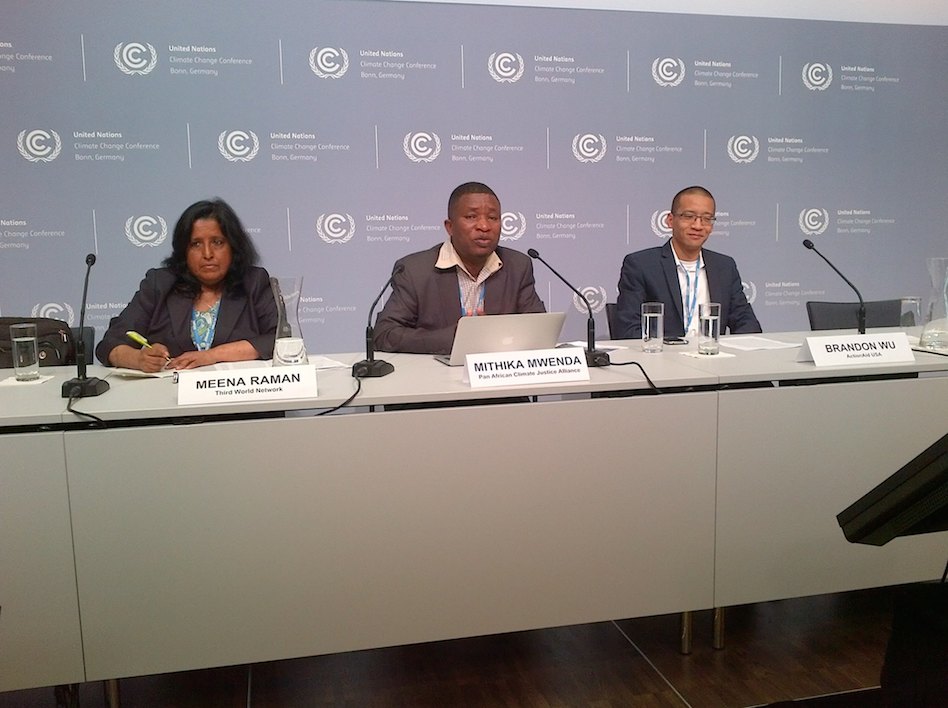
By Esther Opaluwah
African civil society organisations that participated in the just concluded Bonn Climate Change Conference have expressed grave concerns about the progress of negotiations.
As the official negotiations ended on thursday, and with only ten days of negotiations remaining before COP21 in Paris, the popularly held optimism of reaching an agreement on key elements of the new climate change pact in 2015 appears to be crumbling fast.
observers believe that progress, after nearly two weeks of talks in Bonn, was so slow that the chances of world leaders signing up to an agreement on tackling climate change in Paris later this year are receding − and that there is a lack of political will to do so.
However, delegates agreed that a “streamlined” text of a legal agreement based on the negotiations so far should be drawn up and sent to governments to review.
This will cover issues such as how the agreement can be financed, who will cut greenhouse gas emissions, how to adapt to climate change, and compensation for nations badly affected. The negotiators will then come back to Bonn and try again.
Optimists will argue that this is progress, and that the talks were not supposed to be final, but merely moving towards a legally-binding agreement that will be signed by heads of state at the UN Framework Convention on Climate Change in Paris in December.
To Mithika Mwenda of the Pan African Climate Justice Alliance (PACJA), “those who suffer most from climate change impacts in Africa, the indigenous people, women, youth, small-holder farmers, hunters and fishermen will be left to bear the brunt of the climate change crisis. Yet they are the ones least responsible for human-induced climate change.”
“Are we going to be left with a weak and unsatisfactory agreement similar to Copenhagen?” Mithika wondered. “By now we should have a draft proposal, which is responsive to the needs of vulnerable people on: adaptation, loss and damage, finance, capacity building, transparency and accountability”he added.
The alliance further averred that all contributions to the agreement whether pre-2020, post-2020 or INDCs, are biased towards mitigation – aligning with those defined and determined by countries wielding the most power, and those which hold the largest responsibility for the climate crisis.
“As we leave Bonn having made slow progress, we urge the Parties to seize the remaining negotiation opportunities left before Paris to agree on something concrete and illuminate hope to millions of people under threat of the devastating impact of climate change. Let this not be a missed opportunity to ensure a pro-poor and people-centred solution to the urgent climate change crisis” Mithika said.
According to Mohamed Adow, of Christian Aid, “The text which will make up the Paris agreement is like a lens we’re all looking through to a safe and secure world. At the moment it’s a bit grubby and hard to see through. The co-chairs of the negotiations on the Paris agreement need to go away and give it a good clean so that leaders can see what needs to be done.”
Aligning with the rest of the civil society, from both the North and the South in renewing our demands for Paris, the African civil society alliance called for urgent efforts at addressing climate change and demanded demonstrable commitment by developed countries in raising their 2020 pollution targets to the levels required by science and justice (approx. 50% on 1990 levels).
Developed countries were also urged to provide finance and avail technology to ensure that developing countries can complete and fulfil their current climate action plans. On the activation and further capitalisation of the Green Climate Fund, the alliance called for a recipient-driven, community sensitive, publically funded and controlled body that is transformative and that provides no support to fossil fuel or other harmful energy projects.











